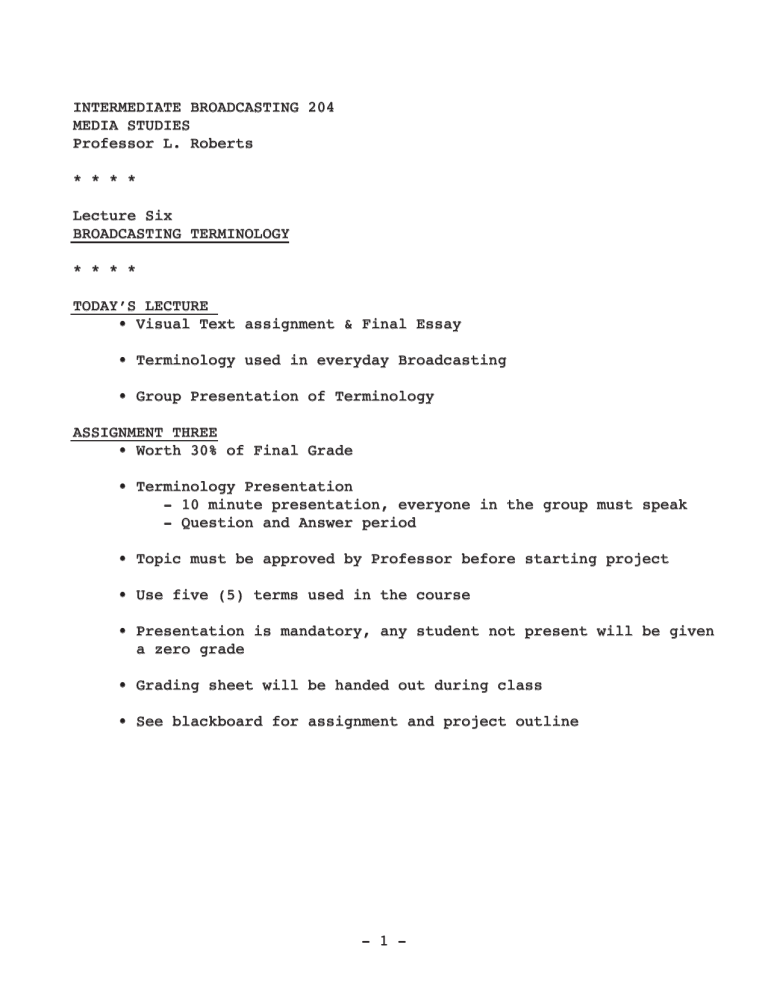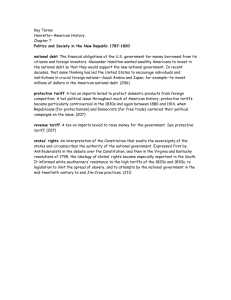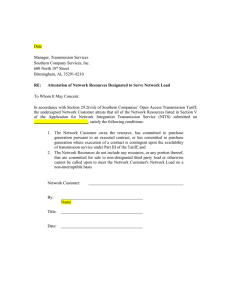
INTERMEDIATE BROADCASTING 204 MEDIA STUDIES Professor L. Roberts * * * * Lecture Six BROADCASTING TERMINOLOGY * * * * TODAY’S LECTURE • Visual Text assignment & Final Essay • Terminology used in everyday Broadcasting • Group Presentation of Terminology ASSIGNMENT THREE • Worth 30% of Final Grade • Terminology Presentation - 10 minute presentation, everyone in the group must speak - Question and Answer period • Topic must be approved by Professor before starting project • Use five (5) terms used in the course • Presentation is mandatory, any student not present will be given a zero grade • Grading sheet will be handed out during class • See blackboard for assignment and project outline - 1 - INTERMEDIATE BROADCASTING 204 MEDIA STUDIES Professor L. Roberts The statesmen of this country can not afford to misunderstand the elements of our national prosperity. Chief among these is our protective policy. Protection has done a great work for the people of this country during the past twenty-five years, and we are glad to be able to say that this fact is now generally recognized and appreciated,even by our industrial rivals in other countries. It is admitted by all except mere theorists that protection aids in the development of all the resources of the country ; that it stimu lates the investment of capital; that it gives steady employment to our own people; that it cheapens the cost of manufactured products while enhancing the wages of labor ; that it cheapens the costoftransportation;thatitfurnishesahomemarket,and there fore a sure market, for much the larger part of our agricultural products; and, finally, that it keeps at home and in circulation large sums of money that would otherwise be sent abroad. * * * * This is what protection for the sake of protection does for us directly ; incidentally it furnishes revenue to the Government through the duties collected on foreign commodities. A tariff for revenue only might furnish the same amount of revenue,but it would not insure steady employment to the people nor produce any of the other benefits which protection brings. The tariffs of 1846 and 1857 were purely revenue tariffs. While they were in operation no do mestic industry prospered as it has since prospered under our pro tective policy. But for the Irish famine, the discovery of gold in California, and the Crimean war the fifteen years during which these tariffs were in operation would have been years of much greater industrial distress in our country than they were. That period in our history ended with the inability of the Government to pay its ordinary expenses ; it was forced to become a borrower at usurious rates of interest. The country was then at peace. Under the Morrill protective tariff and its various supplements down to the present time the country's industrial life has not only been remarkably quickened, but the Government revenue from d u ties on imports has greatly increased. Never since the world began have the industries of any country been so wonderfully developed in a brief time as the industries of this country have been during - 2 - INTERMEDIATE BROADCASTING 204 MEDIA STUDIES Professor L. Roberts the quarter of a century which has elapsed since the passage of the Nevertheless the assertion is sometimes made that a protective tariff is a tax on consumers because it increases the cost of articles the manufacture of which is protected against injurious for eign competition. Those who make this assertion ignore the bene fits of protection to which we have alluded, and they ignore also the price lists and market quotations in recent years, when the inflation of values caused by the expansion of the currency as an incident of our civil war had passed away. The following table will show that protection, instead of being a tax on consumers, has cheapened the price to them of leading manufactured articles of iron and steel since the break in 1873 of the inflated prices which the financial legislation of the war period had created. The prices we give embrace the revenue tariff period already alluded to and the protective tariff period which was ushered in by the Morrill tariff of 1861. These prices are yearly averages for No. 1 anthracite foundry pig iron,best refined bar iron,and iron rails, all per gross ton,at Philadelphia ;nails,per keg,wholesale,at Phil adelphia ;and steel rails, per gross ton,/at Pennsylvania mills. * * * * We now come to consider the practical question involved in the suggestion from unofficial sources that the present tariff'requires general revision. If our protective policy has been productive of only beneficial results to all the people of our country, and if these results are generally conceded,why should any reduction of duties beproposedinanyquarter? First,becauseitisallegedthatmany duties in the present tariff are excessive and therefore burdensome; and, second, because it is alleged that the tariff as a whole is pro ductive of too much revenue,and that the surplus revenue should be reduced in the interest of good government, as well as to relieve the people of unnecessary taxation. These reasons for precipitating another tariff agitation upon the country will be briefly examined . No existing duty which has built up a useful American indus try is too high. If a protective duty has enlisted capital, employ ed labor, promoted competition, reduced prices, contributed to our industrial independence, and restricted the drain of the precious metals to Europe to pay for the products of foreign capital and la bor itshould not be re- - 3 - INTERMEDIATE BROADCASTING 204 MEDIA STUDIES Professor L. Roberts pealed or reduced the moment it has accom plished these beneficent results. So long as it remains on the stat ute-book it can harm no American interest; the competition which it has created will guard consumers against unreasonable prices ; but repeal or reduce it and the industry which it has established is at once placed in jeopardy,the capital invested in it loses its sense of security, activity is succeeded by lethargy, and consumers are soon confronted with advancing prices the benefit of which the foreigner receives. Our experience under the compromise tariff of 1833 and the revenue tariffs of 1846 and 1857 proves the correct ness of these statements. The compromise tariffof 1833,which suc 1 We know of few duties in our present tariff that are higher than are needed for the protection of domestic industries, while, as we have shown,there are several rates of duty in the metal schedule that are wholly inadequate for the protection of our iron and steel industries and for the protection of the Government revenue. noticeable and significant that such demand as now exists for a n other revision of the tariff comes mainly from those who desire a still further reduction of duties than was accomplished in 1883,and who express no anxiety whatever concerning an increase of duties which would tend to restrict the importation of foreign goods. * * * * It is ceeded the protective tariffs of 1824 and 1828,kept all the indus tries of the country in a dying condition for many years before its repeal ; the tariffs of 1846 and 1857 conspicuously retarded the development of our iron industry. In a few years after the pas sage of the tariff of 1846 our iron-rail industry,which had been lit erally brought into existence by the protective tariff of 1842,was dead. The withdrawal of protection after it has once been grant ed has frequently injured the industries of this country fully as much asthefailuretograntitwhen needed. - 4 -


